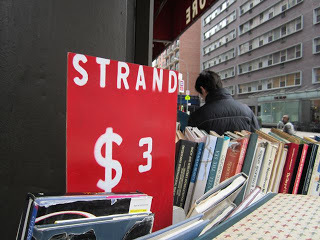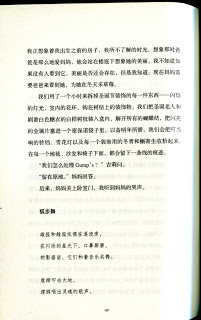Beth Kephart's Blog, page 197
March 1, 2012
the day in pictures







it began early. it moved through rain. my hair broomed up around my head. my client was so kind. and then lovely Melissa Sarno met me in her princess cape of purple and we walked until my hair was a cloud and I was on the train home again.




Published on March 01, 2012 14:13
what makes a children's book great?: the children's publishing conference 2012

As some of you know, I have been having a lot of fun writing for Publishing Perspectives —interviewing book editors like Michael Green, Tamra Tuller, Lauren Wein, and Alane Salierno Mason, review editors (and trend makers) Pamela Paul and Jennifer Brown, and technologists/book lovers like Eric Hellman.
On May 31st, I'll have a chance to represent for this fine publication as one of the speakers at the inaugural Children's Publishing Conference 2012, to be held at the Scholastic Headquarters. I'll be joining (among others) Pamela Paul of the New York Times Book Review, Jacob Lewis, CEO of Figment, Kevin O'Conner, who directs business and publishers relations for Barnes and Noble, NOOK Kids, and agents Rosemary Stimola and Ken Wright.
I hope those of you interested in the future of children's books will consider registering for this event. I know that I am looking forward to it.
For a full press release, please go here.




Published on March 01, 2012 02:34
February 29, 2012
now (an instant)

After a day of thick, gray rain, I imagine spring being near. I imagine myself at Chanticleer garden, in the opening hours. Maybe my friend Annika will be there.
In the meantime, I will be grateful for the day that was. For the enormous kindness of a certain editor who (even in the midst of her great personal busy-ness) stops to write and to give me hope for my Berlin book. For the time I had to return to a memoir-long-in-the-making. For a client who stops to thank me for project work completed thus far. For studently goodness. For a text from my son. "Wrote 11 stories for the TV station today," he said. "You're really good at that," I told him.
I'm taking the earliest train to Philadelphia tomorrow, so that I can take a still-early train to New York. I'll spend much of the day on Wall Street then, but I'll be back in time for dance.




Published on February 29, 2012 17:42
Do e-books free us from distractions? Responding to Tim Parks

This morning Shelf Awareness serves up this quote of the day, and it stops me. I think I might just move on, but I can't.
Because Parks' assertion that reading the e-book frees us from "everything extraneous and distracting" ... "to focus on the pleasure of the words themselves" in no way jibes with my experience. Yes, I have downloaded dozens of books onto my iPad. Sadly, I've left many of them stranded. Unable to scribble in the margins, dog-ear the pages, underline emphatically—unable, in other words, to engage in a physical way with the text—I grew distracted, disinterested, bored. Yes, Michael Ondaatje will always keep me reading. And so will the work of my friend Kelly Simmons, and the words of Julie Otsuka, Leah Hager Cohen, A.S. King, Timothy Schaffert, Paula Fox, and Justin Torres—though I wish I owned all of that work on paper. But here on my iPad—stranded, unfinished—sit Jesmyn Ward's Salvage the Bones, Andrew Winer's The Marriage Artist, Margaret Drabble's complete short stories, and many other tales. These are, most likely, extremely good books, and yet, I find myself incapable of focusing on them in their e-format. I need to interact—physically—with the texts before me. I can't do that, in the ways I'd like to do that, with a screen.
I am also, as a footnote, intrigued by Tim Parks' final lines, when he speaks of moving on from illustrated children's books. With the rise of the graphic novel and the increasing insertion of images back into teen books (and I suspect we'll see that illustration encroachment continue), I wonder if we have really moved away from illustrated texts. I wonder, too, if we should. Art is not just for juveniles, after all.
Here is the quote at length, as excerpted by Shelf Awareness.
"The e-book, by eliminating all variations in the appearance and
weight of the material object we hold in our hand and by discouraging
anything but our focus on where we are in the sequence of words (the
page once read disappears, the page to come has yet to appear) would
seem to bring us closer than the paper book to the essence of the
literary experience. Certainly it offers a more austere, direct
engagement with the words appearing before us and disappearing behind us
than the traditional paper book offers, giving no fetishistic
gratification as we cover our walls with famous names. It is as if one
had been freed from everything extraneous and distracting surrounding
the text to focus on the pleasure of the words themselves. In this sense
the passage from paper to e-book is not unlike the moment when we
passed from illustrated children's books to the adult version of the
page that is only text. This is a medium for grown-ups."
--Tim Parks in his post headlined "E-books Can't Burn" at the New York Review of Books blog




Published on February 29, 2012 06:03
February 28, 2012
Undercover in Chinese (a nice gift at my door this late afternoon)


Today at Penn we taught each other something about second-person memoir, distance, intimacy, essential remove, and compassion. B bought us cookies because I, having run long during a lunch-hour interview, was flat out of time. B is just like that. We love our B.
At home I found a package tossed up against the door. It was heavy and, I discovered, pink. The Chinese translation of Undercover. I like having a pink jacket all my own. I like the float of flowers.
I like this.
(A post-dinner post script. According to this Publishing Perspectives story, Shanghai 99 Readers' Cultare Co. is a rather large entity in China, having published 200 titles in 2008, 65% of which were translations of authors such as Philip Roth, Paul Auster, Stephen King, and Dan Brown. Its web site serves as one of China's largest online bookstores, and its book club is the only nationwide book club in the country, or at least was at the time this article was published.)
I like this even more.




Published on February 28, 2012 14:51
work in progress: the teaching of memoir

Maybe it doesn't sound all
that Ivy League or resume building to ask your students to honor the smear of
childhood or to heed the rhythms of remembered talk. The negotiation
of once with the language of right now is unquantifiable.
It's also a tad shy of rigorous to conduct a classroom full of
eased-back kids—dreamers and window watchers, scribblers and flippers of pens,
dismantlers of paper clips.
There's no science to teaching creative nonfiction, and there are no
rules, and if one or two of the students emerge from the reminiscing haze with
a sentence that feels new, don't bet that they all enjoyed the ride.




Published on February 28, 2012 04:29
February 27, 2012
future progressive, future perfect, and sad melodies: House of Prayer No. 2:

Very slowly this time, I re-read Mark Richard's House of Prayer No. 2, the memoir we'll be discussing in class tomorrow. We'll be talking about time—its compression, its meaningfulness and meaninglessness, the power of the future progressive tense, the seduction of the future perfect—and how Richard both elides and dwells to keep us within the frame of his memoiristic purpose. I am looking forward to that conversation.
As I read, I again and again stumbled across passages that have peculiar and particular relevance to me right now. Good books do this. Good books speak directly to you.
How about this, from the immaculate House of Prayer No. 2?
You are also interested in how you can create tension in texts between what meanings the words are conveying on the page and what the sounds of the words themselves are evoking in a reader. Why are certain melodies sad? Melodies without words.
[image error]




Published on February 27, 2012 16:50
new additions to my library

When my American Express bill came in this past month, something odd and spectacularly unprecedented occurred: I owed a mere ninety-nine cents. True, I have been so holed up here, so focused on work, that I've been operating as a blinkered horse, my eyes on the finish line (s), my mind shutting out all purchase-able distractions. Also true: Except when it comes to buying gifts (I buy many, many gifts) I have never been exactly profligate. Malls drive me batty. Excess crowds me in. My decorating aesthetic is whatever lies between homey and uncluttered, warm and just enough. My wardrobe features three pairs of jeans, some turtlenecks, some sweaters/coats, an occasional skirt, and some dresses, for when I have to wear dresses. My mother used to buy me my most interesting, most meaningful clothes. She passed away several years ago, and I never rose to the challenge.
(I do like shoes. By my count, I have too many shoes.)
Still, what I do buy is books—I buy a lot of books—in support of an industry, in specific support of specific authors. Thus, I rectified my no-buying spree yesterday by adding a number of titles to my personal library, all of them, I realize, falling into the nonfiction camp. That's nonfiction the way I define it, and not the way John D'Agata wishes I would. (For more on the D'Agata controversy, I suggest you read the Gideon Lewis-Kraus RIFF in the New York Times.)
Among the titles that will (at one point) be reported on here are the following:
Rough Likeness: Essays (Lia Purpura)
Create Dangerously: The Immigrant Artist at Work (Edwidge Danticat)
Behind the Beautiful Forevers: Life, death, and hope in a Mumbai undercity (Katherine Boo)
Winter: Five Windows on the Season (Adam Gopnik)
House of Stone: A Memoir of Home, Family, and a Lost Middle East (Anthony Shadid)
Istanbul: Memories and the City (Orhan Pamuk)
The Naive and the Sentimental Novelist (Orhan Pamuk)[image error]




Published on February 27, 2012 04:48
February 26, 2012
The Art of Fielding/Chad Harbach: Reflections

It took me many months to read The Art of Fielding, Chad Harbach's much-discussed debut novel. It has moved from my bag to the floor to the couch to a shelf back onto the floor—but never into the pile of books I finally give up on. It wasn't the quality of the book that kept me from the story; it was time. I could never find enough of it to read all 512 pages.
This weekend, I did—walked away from my own work, sat down as snow showers were followed by rain then sun, and read. I liked this story, liked the way that it was told. I liked the actual paper the book was printed on—smooth paper for a smooth story. True, this story about a college shortstop, a college president, a college catcher, a girl who arrives late to college, and a college star (you get the point) could be preposterous at turns, but it never lost its seamless sound. That's because Chad Harbach writes careful and yet still light-filled sentences that honor not just story, but idea.
I dog-earred many pages. I'm going to quote, below, from the paragraph that most moved me, that captured the mood of my present days, my internal monologue. The passage comes late in the book, but I don't think it's a spoiler. It is, instead, an elegant representation of how a talented novelist can be writing a story, complete unto itself, and at the same time be talking directly to the reader who holds the book in her hand. Harbach in this passage is writing about a kid named Schwartz. But he's doing more than that. He's reaching farther.
A final word: I went onto Amazon to see what other readers had thought after reading Fielding. I should not have done that. The unkind comments claiming this book to be pedestrian, for example, or cardboard, or cliche, left me shuddering and steeped inside this question: How is ridicule acceptable, when healthy criticism will do?
A passage that moved me, from The Art of Fielding:
He hadn't pushed through that one last barrier, his fear of succeeding, beyond which the world lay totally open to him. Schwartz would never live in a world so open. His would always be occluded by the fact that his understanding and ambition outstripped his talent. He'd never be as good as he wanted to be, not at baseball, not at football, not at reading Greek or taking the LSAT. And beyond all that he'd never be as good as he wanted to be. He'd never found anything inside himself that was really good and pure, that wasn't double-edged, that couldn't just as easily become its opposite.




Published on February 26, 2012 10:00
when good things happen to good people: congratulations to Alyson Hagy, Lilian Nattel, Alex Kotlowitz, Laura Geringer, Buzz Bissinger
This morning I take a moment to honor my friends whose work is gaining the attention it most assuredly deserves.
Alex Kotlowitz, a supremely talented writer and journalist who recently transitioned into film, won a Spirit Award for his documentary, "The Interrupters," made with Steve James for Kartemquin Films. It's an extraordinary recognition, and I'm so happy for him.
Alyson Hagy, one of my dearest friends and one of the great Renaissance ladies of our times (not just a writer and a teacher, but a university leader and an athlete), received a starred review from Publishers Weekly for her most-magnificent Boleto , which will appear in stores in May. It's the first of many accolades for Alyson, who was cited by PW as "fast becoming a recognizable author of the American West." I have no words. Her time has come.
Lilian Nattel, meanwhile, is enjoying a rush of deeply deserved attention for her groundbreaking novel, Web of Angels, a book I recently reviewed here. She's on the radio, she's in the papers, and her book is selling. After many years of work on this book, she emerges with a winner.
Laura Geringer, who first invited me to write for teens however many years ago, will, like the rest of us, be watching the Oscars this evening. But Laura will have a very special connection, for an animated short in which she played a key role, "The Fantastic Flying Books of Mr. Morris Lessmore," is up for one of those shiny figurines. It's a short dedicated to a great man in books, Bill Morris—a man Jennifer Brown, featured last week in Publishing Perspectives, refers to as her unforgettable mentor. Many bibliophiles are cheering this short on.
Lots of people, finally, are talking about Buzz Bissinger's remarkable memoir, Father's Day, also due out in May. Buzz broke my heart with this book, as I wrote here. He's about to break the hearts of many. If things go as planned, Buzz will be joining my classroom this Tuesday, talking about how this book got made. We will be lucky to have him.




Published on February 26, 2012 05:04



